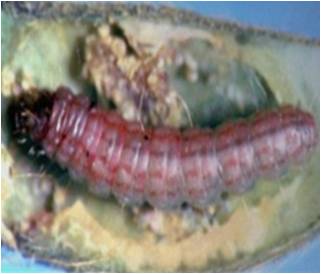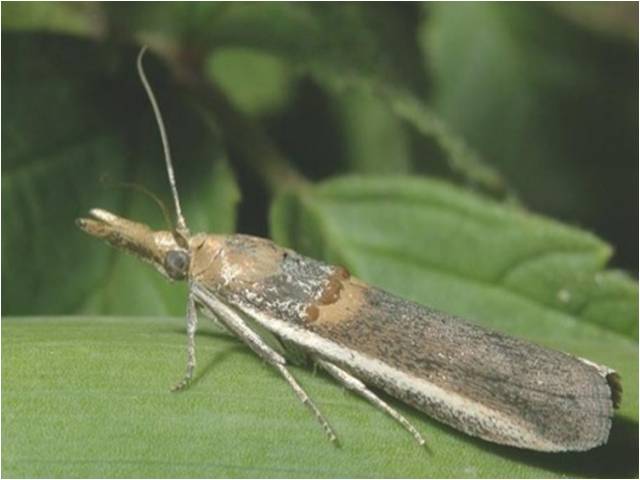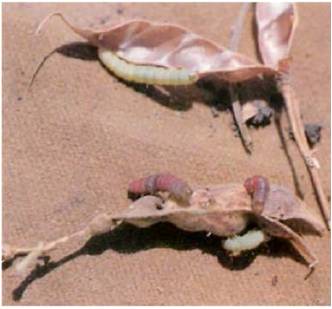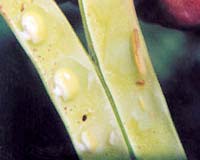Crop Protection :: Pest of Red Gram
| Spiny pod borer: Etiella zinckenella |
Symptoms of damage
- Dropping of flowers and young pods
- Older pods marked with a brown spot where a larvae has entered
- The larva feeds inside green pods and then on pod surface, webbing together 2-4 pods.
Identification of the pest
- Eggs: Eggs are laid singly (or) in groups preferably at the junction of the calyx and pod or on the pod surface. A female lays 47-178 eggs, which hatch in 5-6 days.
- Larva: The larva bores within the green pods and feeds on seeds. When fully grown the larva drops to ground and forms a cocoon about 2.5 cm below ground or under dry leaves greenish initially, turns pink before pupation. It has 5 black spots on the prothorax.
- Pupa: Pupal duration lasts for 9-20 days depending on the climate. The moths pair 24-30 hour after emergence.
- Adult: Brownish grey moth. Prothorax are orange in colour. Fore wing has a white stripe along the anterior margin.
|
 |
 |
| Larva |
Adult |
|
Management
- Conserve natural enemies like Tetrastichus sp., Bracon hebetor, Phanerotoma sp. and P. hendecasisella.
- ETL 10% affected parts
- Deep summer ploughing in 2-3 years to eliminate quiescent pupa.
- Early sowing, short duration varieties.
- Avoid closer plant spacing.
- Grow tall sorghum as comparison crop to serve as biological bird perches
- Collect and destroy larvae and adults to the extent possible
- Install pheromone traps at a distance of 50 m @ 5 traps/ha for each insect pest.
- Install Bird perches @ 50/ha.
- Setting of light traps (1 light trap/5 acre) to kill moth population.
- Control is achieved by releasing of Trichogramma chlionis at weekly intervals @1.5 lakh/ha/ week for four times.
- Conserve green lacewing, predatory stink bugs, spider, ants
- Application of NPV 250 LE /ha with teepol 0.1% and Jaggery 0.5% thrice at 10 – 15 days interval commencing from flowering stage. (Note: Insecticide / Ha NPV spray should be applied when the larvae are in early stage).
- Bt @ 600 g, neem oil/ pungum oil 80 EC @ 2ml/lit
- Spray NSKE 5% twice followed by triazophos 0.05%.
- Apply any one of insecticides at 25 kg/ha quinalphos 4D, carbaryl 5D
- Spray insecticide Quinalphos 25 EC @ 1000 ml/ha.
|
|




